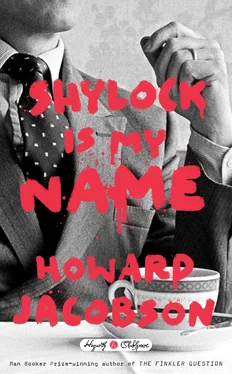“You are a saint,” Plurabelle told him.
He shook his head, still without opening his eyes.
Sitting together in the little parlour that bore more the impress of his taste than hers — she had none, was his private view — they found a form of words they hoped would pacify the fiend who threatened the continuance of their idyll.
Plurabelle wondered whether these words should be witnessed by a Justice of the Peace. D’Anton thought not. A note on his paper would, he believed, suffice. Strulovitch, of all people, would surely know him as a man whose stern probity was beyond question.
“ I hereby pledge requital for your grievance, ” he wrote. “ Let my person stand as surety for Gratan’s return within a fortnight. ” (Plury had wanted a week, D’Anton a month. A fortnight was their compromise.) “ If he is not back to face his punishment by then, take from me what you would take from him. I ask for no alleviation of his offence save this, and trust it will be the end of the matter. ”
And he signed it with that flourish of which Strulovitch had already seen an example.
He wished he could have included Love First’s Lesson in the deal— I ask for no alleviation but would appreciate your throwing in Mr. Solomon —but it was important Plury remained in ignorance of any of that.
D’Anton sighed. How weary he had grown of these entanglements in the love affairs of others. How he wished he had never introduced anyone to anyone. How high the price of friendship had become.
“You really are a saint,” Plury repeated when he showed her what he’d written. “Though no saint I was ever told about at school had your gift for language.”
Some mole of probity in his nature — or maybe it was simply impatience — compelled him to shake off her praise. “If you knew more,” he said, “you wouldn’t say that of me.”
Plury looked intrigued. “Tell me,” she said.
He looked deep into her troubled eyes. “Can I count on your absolute confidence?” he asked.
“I swear,” she said, “upon our friendship. I swear on the sacred melancholy that binds us.”
“Not a word to another soul, your promise. Not even to Barney.”
“Not a syllable even to him.”
Whereupon he drew her to him, much as a lover might, and whispered words of wildness in her ear.
Anyone close to Plury would have marvelled at what she did then. She threw back her head and roared with laughter. It could have been enough to cure her of her sadness for ever.
“I can’t wait,” she said, between gasps of unaccustomed merriment, “to see the bloodsucker’s face.”
“The Jew’s you mean?”
“The Hebrew’s, yes,”
“You must be referring to the Israelite.”
“The Christ-Killer, yes. The crooked-nose…”
“Plury, stop that!” D’Anton laughed.
There had not been so much mirth heard in Plury’s Utopia for many a month.
—
Because she wanted to be certain the pledge would be received, because she knew herself to be no less culpable than D’Anton, because she wanted to see the devil with her own eyes, and because she was devising a little something extra of her own, Plurabelle delivered D’Anton’s note in person, driving the short distance to Strulovitch’s house — she was surprised to discover they were such near neighbours — in her housekeeper’s Vauxhall. She couldn’t have explained to herself her decision not to take the Porsche or even the Volkswagen Beetle, but she was miffed to discover a Mercedes in the drive.
She shuddered when Strulovitch himself opened the door to her. The hand with which he took what she handed him all but froze hers. This was a further surprise. She had come prepared to face the fires of hell. In her mind’s eye Strulovitch was a man with the complexion of a devil and a scaly hand. What she hadn’t expected was this icy blast. No wonder poor Beatrice had fled. I was right to have taken her in and warmed her through, she thought, and I am right to assist her now. God help us all.
But she was wrong about one thing. The person to whom she handed D’Anton’s sainted offer was not Strulovitch.
It was Shylock.
Although he was used to her being away — at the academy in the day and the Devil knew where else at night — Strulovitch had begun to miss Beatrice. Yes, they fought the minute they found themselves together, but fighting was an expression of love, wasn’t it? If truth be told, he couldn’t remember a time when they hadn’t fought, but since Kay’s stroke the warfare which was another name for love had intensified. So he had to put a delicate question to himself: had she become a sort of wife to him?
He must have answered that affirmatively, because from the moment Beatrice decamped he had begun to spend more time with Kay. Loneliness, was it? Or guilt? He thought both. But then it was a habit of his mind to think both. Hence his being an on-again off-again Jew. Being a Jew was everything to him, except when it wasn’t. Which is a debilitating characteristic of the Jewish mind; unless it is a strength. As far as Kay went, he felt every feeling it was possible to feel, while sometimes thinking he felt nothing. There was an advantage in feeling nothing; it enabled him to get on with his life and help Beatrice get on with hers. But if he’d failed with Beatrice then he’d failed half the opportunities that feeling nothing for Kay had given him. It behoved him, therefore — since it looked as though he had failed with Beatrice — to return to Kay a proportion of what was owing to her.
After calling on D’Anton and delivering his ultimatum, he returned home and went immediately to sit with her. He acted as though she must have been waiting impatiently to hear what had transpired. He sighed deeply and breathed out. As though to say, Just give me a moment to catch my breath. “Well we’ll have to wait and see what that yields,” he declared at last.
Though there was concern about her chest, her windows were open in all weathers. If one of her carers closed them, she was able to convey to another that she wanted them open. After he’d delivered her his news, Strulovitch sat in silence and watched the curtains flutter as though they were the only things of living interest in the room. He held her hand absently and was surprised to feel the gentlest squeeze from her fingers. He turned his attention from the window to look at her. Had she understood him? Did she register his anxiety? Did she know Beatrice was missing?
“Are you all right, my dearest love?” he asked, and strangely it was his own words, not any movement she had made or any expression in her dead eyes, that caused his tears to flow. Was he weeping for himself?
He had shut his senses down, sealed his entire apparatus of memory and affection off from her, otherwise he would not have been able to function, and where was the point in both of them being as Kay was? Had he allowed himself to remember what he’d loved in her he’d have come into her room each morning, wrapped his arms around her legs, and sobbed until nightfall. You remember and you die; if you want to live, you forget.
But he had called her “my dearest love” and for a moment she was his dearest love again and he could even dare to persuade himself that he was hers.
And if he was — if somewhere locked away in there a memory of what she’d felt for him stirred as faintly as her sun-yellow curtains — was it to be welcomed? Was it of the slightest earthly use to her for such a buried remembrance to be disturbed? Or would she too have wept for the sadness of it had she been able?
He held her hand more firmly. He had no right to take such a risk with her feelings but he took it nonetheless. “You look pretty today, beloved,” he said, and kissed her brow.
Читать дальше












